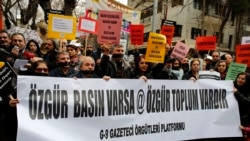The terror attack in Paris targeting the staff of the satirical magazine Charlie Hebdo and the beheadings of journalists by ISIL are horrific examples of the extreme dangers faced by journalists today.
In an address at a U.S. State Department-sponsored conference aimed at improving security for reporters, Secretary of State John Kerry acknowledged, ”There’s no way to eliminate the risk completely, except by keeping silent, and that’s what we call surrender.”
Mr. Kerry noted that in the past the primary threat to journalists consisted of being in the wrong place at the wrong time; it was rare that a journalist was intentionally targeted. Now, however, journalists “are attacked for what they have written, silenced for what they have witnessed, or kidnapped for the leverage their capture may provide.”
The United States is determined to make freedom of the press an important tenet of its foreign policy goals. Each day, Secretary Kerry said, America’s diplomats make clear – either directly to governments or to the public – our firm backing “for the right of people to speak, publish, broadcast, blog, tweet or otherwise express themselves openly and without fear and without retribution.”
When journalists are unfairly detained, U.S. diplomats raise the issue in meetings with foreign officials at every level, Secretary Kerry said, “and that is true whether the journalist is an American… or from some other country where the rights of journalists are violated all too often.”
Moreover, to help bolster the security for local media in difficult situations, the State Department launched a pilot program two years ago called SAFE, focusing on digital and physical security, psychosocial care, and the establishment of regional security advisory networks -- a program that has now reached some 300 reporters. In addition, with the U.S. Agency for International Development, the State Department has programs that support independent media in more than 40 countries.
Despite the threats faced by today’s journalists, Secretary Kerry expressed confidence in the future of press freedom and the commitment of journalists to discover and report the truth even in the face of implacable resistance and grave danger.
The United States, he said, “will stand with you every step of the way, in all the ways that we have at our disposal.”

















